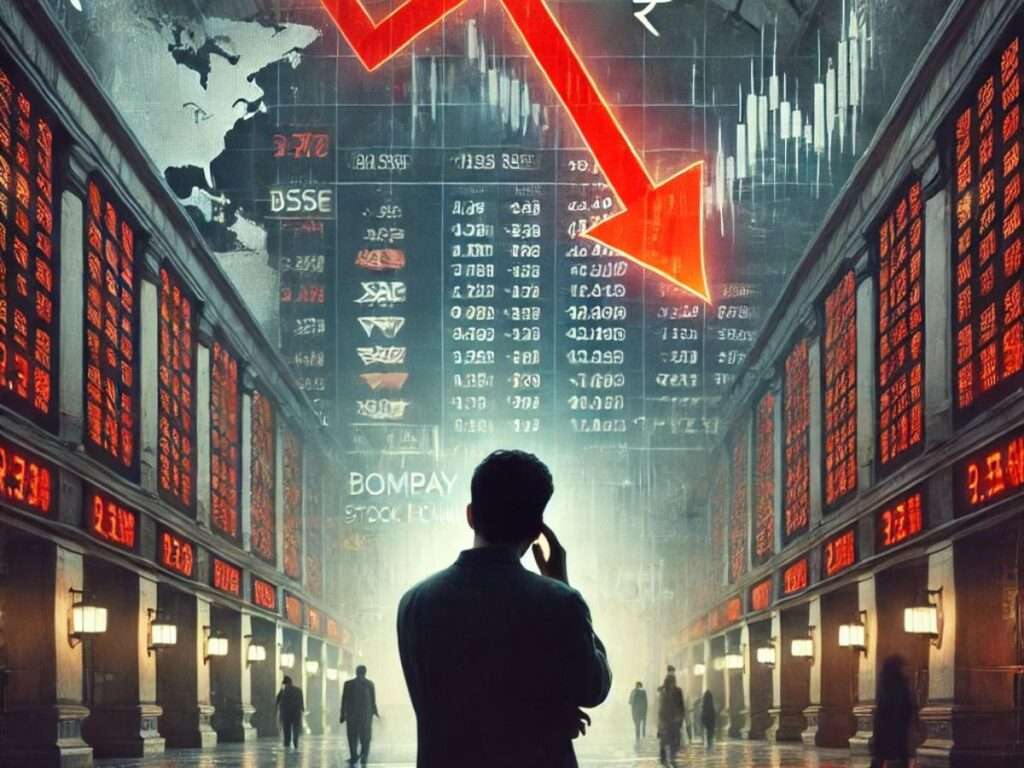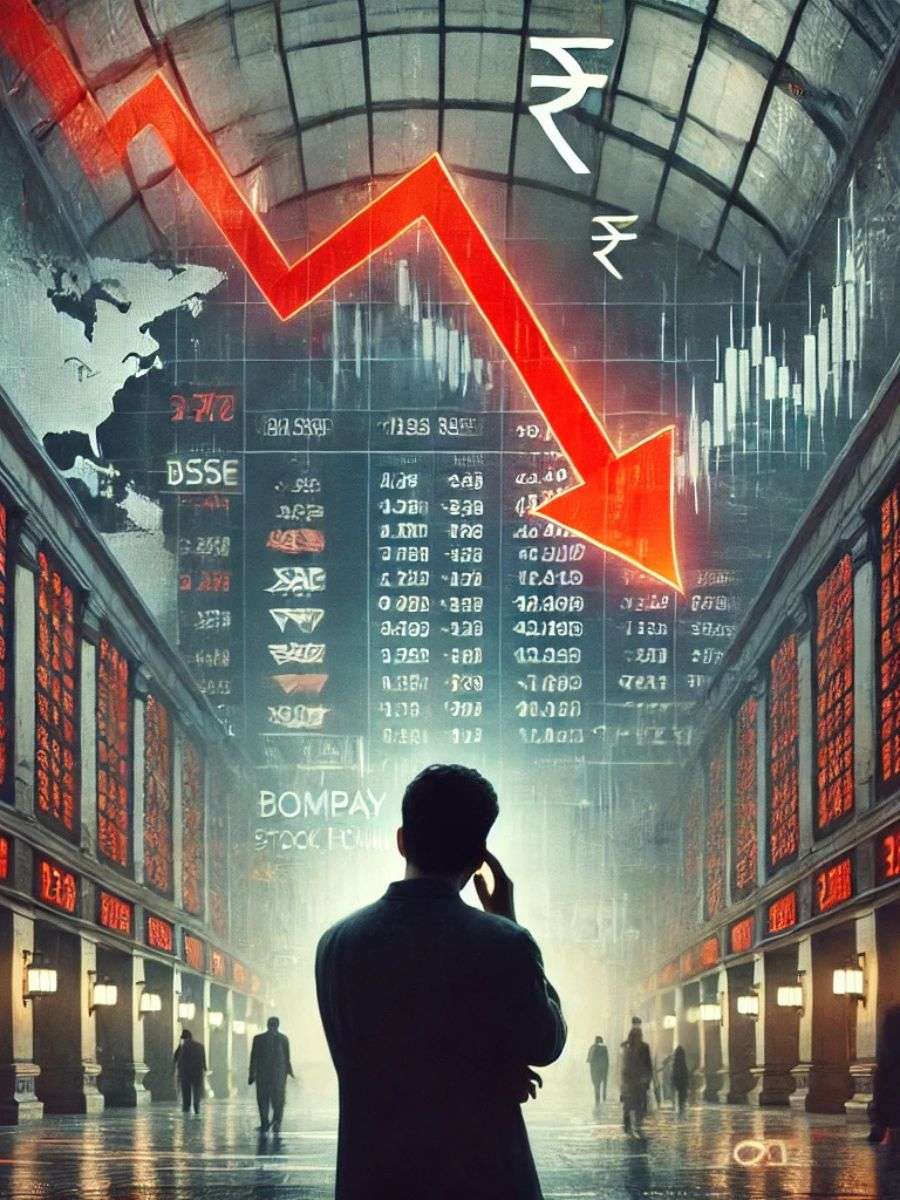The Indian stock market experienced a dramatic downturn today, with the Nifty 50 index dipping below the critical 24,000 mark and closing at 23,914, a 1.49% decline. The Sensex also tumbled, losing 1,200 points to settle at 79,043, marking a 1.48% drop. While the mid-cap and small-cap segments remained relatively steady, heavy selling in blue-chip stocks dominated the market narrative. This stock market crash was driven by a mix of global and domestic factors, shaking investor confidence.

5 Major Factors Behind the Stock Market Crash
1. Absence of US Market Guidance
The closure of US stock markets due to a public holiday left Indian investors without the usual global cues. Yesterday’s rally, which was influenced by positive sentiment from US markets, reversed sharply, as traders booked profits amid the uncertainty.
2. Middle East Geopolitical Crisis
The stock market crash was further exacerbated by escalating geopolitical tensions in the Middle East. Intensified conflicts between Israel and Hezbollah raised concerns about oil supply disruptions and broader economic impacts, pushing investors to adopt a risk-averse stance.
3. Union Budget 2024 Approaching
With the upcoming Union Budget just two months away, investors are treading cautiously. Domestic institutional investors (DIIs) have scaled back aggressive buying, waiting for clearer policy signals, which contributed to the lack of market momentum.
4. Strengthening of the US Dollar
A strong US dollar added pressure on emerging markets like India. Foreign institutional investors (FIIs) have been pulling funds out of Indian equities to invest in safer avenues like US treasury bonds, deepening the liquidity crunch and worsening the stock market crash.
5. Russia-Ukraine Conflict Intensification
The ongoing Russia-Ukraine war has shown signs of escalation, fueling global economic uncertainty. This has prompted traders to exit riskier assets, amplifying the sell-off in the Indian market.
Sectoral Performance: IT Leads Declines
IT Sector Under Pressure
The IT sector faced heavy selling pressure during the stock market crash. Industry giants like Infosys and TCS witnessed sharp declines as global demand for technology services appeared to weaken amid geopolitical concerns.
Major Contributors to the Decline
Heavyweight stocks such as Reliance Industries and HDFC Bank also posted significant losses, further dragging down the Sensex and Nifty indices.
Adani Group’s Stability
Amid the downturn, some Adani Group stocks managed to hold their ground. However, their performance was not enough to offset the broader negative sentiment impacting the market.
How Broader Markets Performed
Interestingly, while frontline indices like Nifty 50 and Sensex faced steep losses, mid-cap and small-cap indices remained relatively stable. This indicates selective buying in these segments, reflecting a hint of resilience among certain pockets of the market.
Market Outlook: What’s Next for Investors?
The stock market crash has left investors questioning what lies ahead. Analysts highlight that the Nifty 50’s fall below 24,000 indicates potential short-term weakness. The immediate support level is pegged at 23,800, with further downside risks if this level is breached. A recovery above 24,050 could, however, mitigate fears of a prolonged bearish phase, suggesting the current crash may be a temporary correction.
Conclusion
Today’s stock market crash reflects the sensitivity of financial markets to global and domestic developments. While short-term volatility is likely to persist, investors are advised to adopt a cautious but optimistic approach. Monitoring geopolitical developments and key market levels will be essential to navigate this turbulent phase. For long-term success, patience and focus on strong fundamentals will be key.
FAQs About the Stock Market Crash
What caused today’s stock market crash?
The crash was triggered by multiple factors, including global geopolitical tensions, cautious domestic sentiment ahead of the Union Budget, and the absence of cues from US markets.
How did Nifty 50 and Sensex perform during the crash?
The Sensex declined 1,200 points to close at 79,043, representing a 1.48% decrease, while the Nifty 50 fell 1.49% to close at 23,914.
Which sectors were most affected?
The IT sector bore the brunt of the crash, along with major stocks like Reliance Industries and HDFC Bank contributing significantly to the decline.
Is this the beginning of a long-term downtrend?
It’s too early to conclude. Analysts suggest watching critical levels like 23,800 on the Nifty 50. A rebound above 24,050 could signal that the sell-off was primarily due to profit-booking.
How do global geopolitical tensions impact the stock market?
Geopolitical conflicts, such as those in the Middle East and Ukraine, create uncertainty and often lead to a flight of capital from equities to safer assets, triggering market volatility.
What should long-term investors do during a stock market crash?
Long-term investors should focus on fundamentals, avoid panic selling, and use market corrections as an opportunity to accumulate quality stocks at attractive valuations.
ZERODHA 1) : https://zerodha.com/open-account?c=EJ4366
Angelone 2) : https://tinyurl.com/2gloc3g6 or
Upstox3): https://link.upstox.com/9w4tNo1rK8au7VK47









